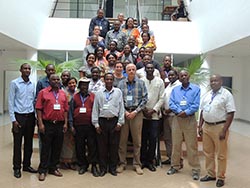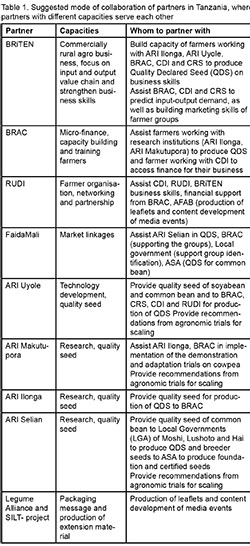Freddy Baijukya chose this article Podcaster 42, December 2016 because N2Africa has been successful in creating partnerships for research and development in all countries where the project is implemented to ensure that farmers benefit from symbiotic N2-fixation by grain legumes. However, ensuring strong incentives for partners was considered a challenge. In this article, we presented a case where the interests of all stakeholders were aligned and the relationships among partners fostered so that they grew to be mutually beneficial. We now see partnership among our partners being continually cultivated, growing stronger and productive, and there is a clear and mutual understanding of the contribution and roles of each partner appearing in this article. Challenges are inevitably there; but we see most partners trying to create a stimulating environment conducive to collaboration for innovative solutions.
“Sustainability” was the theme of the third N2Africa Tanzania review and planning meeting, that took place on October 19th-20th, 2016 in Dar es Salaam, Tanzania. The meeting brought together 34 participants drawn from partner institutions. Representatives from Rural and Urban Development Initiative (RUDI-IBB project); BRAC-Tanzania; Clinton Development Initiative (CDI); Building Rural Incomes Through Enterprise (BRiTEN); Faida-market Link (FaidaMali); Africa Fertilizer Agribusiness Partnership (AFAP); Farm Radio International (FRI) also representing projects Scaling-up Improved Legume Technologies (SILT) and Gender and Legume Alliance (GALA); Agricultural Research Institutes Uyole, Makutopola, Selian and Ilonga; District Councils of Hai, Moshi, Lushoto and Kongwa; N2Africa-Tanzania team and N2Africa technical teams comprised of Senior Business Development Officer, M&E specialists and three MSc students who are supported by the project attended the meeting.
In his opening remarks, Dr Freddy Baijukya, N2Africa Tanzania coordinator, appreciated the commitment and effort made by partners in the process of diffusing the legume technologies to smallholder farmers. He said “through partnership, N2Africa has expanded the area of operation, reached many institutions working on legume development creating an opportunity to reach more farmers with legume technologies”. He told the participants that, while the project had successfully institutionalized its approaches, it remained a challenge to ensure sustained delivery of legume technologies.
 |
Picture left: Partners southern cluster discussing collaboration to improve their work plans 2017 Picture right: N2Africa review meeting 2016, Dar es Salaam |
 |
In their remarks, representatives of BRAC, BRiTEN, FaidaMali and CDI appreciated the partnership that N2Africa had built and emphasized on the need to ensure that farmers have access to knowledge, improved seeds, fertilizers and inoculants and markets for their produce. They emphasized the need to link agro-input dealers and last mile networks in supplying legume agro-inputs to farmers and agri-business clusters established. Furthermore, they iterated the importance of establishing actual input and output demand in order to create a climate, in which the private sector is attracted to invest in small-scale farmer supply chains.
|
Edward Baars, the Senior BDO, presented the strategy for input demand projection. He said the Tanzanian combination of partnerships is qualified to deliver activities related to making input supply chain more effective, predicting demand, stimulating supply and delivery and linking farmers to agro-dealer networks. He presented the case of the Legume Alliance (e.g. iLogix, AFAP, ASA, Farm Radio, Shujaaz, CABI, KIT, SARI, CRS and N2Africa) to show how different combinations of partnerships can deliver. He urged partners to upload farmer and retailer databases with mobile phone numbers to the ICT platform. This database allows to take a representative sample of farmers in the target areas to assess the demand for inputs by conducting computer aided telephone interviews (CATI). He also emphasized the importance of creating awareness and use of the improved database system for different partners. Theresa Ampadu-Boakye, M&E specialist, emphasized the importance of collaboration to achieve impact. She indicated that most partners were specialized in particular topics and needed to come out of their closets. She suggested that partners working in the same area should capitalise on each other and collaborate more closely in the coming season. Partners clearly indicated in their work plan 2017 which new modes of collaboration between partners were developed and what was expected from each partner (Table 1). |
 |
Closing the meeting, Mrs Joyce Kessy, District Crop Officer for Hai, on behalf of the participants, thanked the organizers for a successful meeting and N2Africa for its continues efforts to increase legume productivity in smallholder farmers. She reminded participants to observe and implement the developed work plans 2017, as they were realistic.
Freddy Baijukya, Country Coordinator Tanzania, Minke Stadler and Mwantumu Omari
